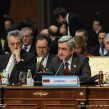
Karabakh Deadlock: Future Uncertainties
Publication: Eurasia Daily Monitor Volume: 8 Issue: 14
By:

The Organization for Security and Cooperation in Europe (OSCE) summit in Astana in early December 2010, was a symbolic showcase for the year-long failed negotiations on Karabakh. Azerbaijan’s President, Ilham Aliyev, and his Armenian counterpart, Serzh Sargsyan, did not even meet on the sidelines of the summit, leaving the OSCE Minsk Group co-chairs with the traditional role of making optimistic statements. For long-term observers of the peace process, it is clear that the negotiations have reached a deadlock while no immediate breakthrough can be expected.
Following several years of both parties pursuing a lasting peace settlement, in 2010 Yerevan openly ignored the Minsk Group’s proposal, effectively leaving Baku and the co-chairs questioning the seriousness of Armenia’s intentions to find a resolution to the conflict. The Minsk Group’s proposal, based on the so-called “updated Madrid principles,” envisages a step-by-step resolution of the conflict: Armenia would first liberate the surrounding occupied territories, an interim status for Karabakh providing guarantees of security and self-governance (after the displaced Azerbaijani population returns), culminating in the future determination of the final legal status of Karabakh through a legally binding expression of the will of the people (Trend News Agency, December 29).
The US, Russia and France supported this plan, according to statements by the leaders of each country during G8 summits, held in Italy and Canada. In January 2009, during a meeting in Sochi between Aliev and Sargsyan, the latter asked for two weeks to respond to the peace proposal: which never came. It is unclear what motivations are involved in this prolonged silence. Is Yerevan trying to intentionally prolong the peace process? Or is the Armenian government uninterested in a lasting peaceful resolution?
Addressing a NATO forum in Brussels on October 1, 2010, Azerbaijan’s Foreign Minister, Elmar Mammadyarov, stated: “We have now a very delicate situation. It is not only about whether Armenia accepts the proposal by the OSCE Minsk Group. It is whether Armenia is sincerely willing to change the status-quo in any way and under any condition. We are having our doubts. There are too many worrying signals that suggest Armenia is not interested in a peaceful solution to the conflict” (www.mfa.gov.az, October 2, 2010). The Azeri foreign minister added that an increasing number of ceasefire violations and Armenia’s support for the growing settlements in the occupied territories are signals concerning Baku.
Some officials in Baku believe that nothing is surprising about the current deadlock. It is simply that the process has reached its natural conclusion and that Armenia has finally lifted its mask. “We always knew that Armenia was not interested to returning the occupied lands. But it is important that the international community now witnesses this first hand,” a high ranking official in the Azeri government told Jamestown.
Yet, in the current deadlock, commentators are speculating on the possible steps that the OSCE co-chairs and Baku might take in order to sustain the peace process. The OSCE summit’s statement on Karabakh stated: “the time has come for more decisive efforts to resolve the Karabakh conflict. The three OSCE co-chair countries pledged their support for the presidents of Azerbaijan and Armenia to make the necessary decisions to reach a peaceful settlement. They urged the leaders of Armenia and Azerbaijan to focus with renewed energy on the issues that still remain in the Basic Principles, and instructed their co-chairs to continue to work with the parties in the conflict to assist in these efforts” (www.osce.org, December 3, 2010). While this statement clearly points to the necessity to make decisive efforts and renew attempts to resolve the issue, few in Azerbaijan’s political circles believe that 2011 will yield any breakthrough.
Thus, the increasing military budget in Azerbaijan and the additional attention to soldiers dying on the ceasefire line, as was the case with Lieutenant Mubariz Ibrahimov, are among some of the signs of frustration in Baku. Although war is unlikely, growing tensions and a gradual escalation of the conflict is not excluded. When the peace process does not produce dividends and from Baku’s perspective, Armenia openly ignores a constructive OSCE proposal, then sustainable stability and genuine reconciliation of the people are under serious threat.




